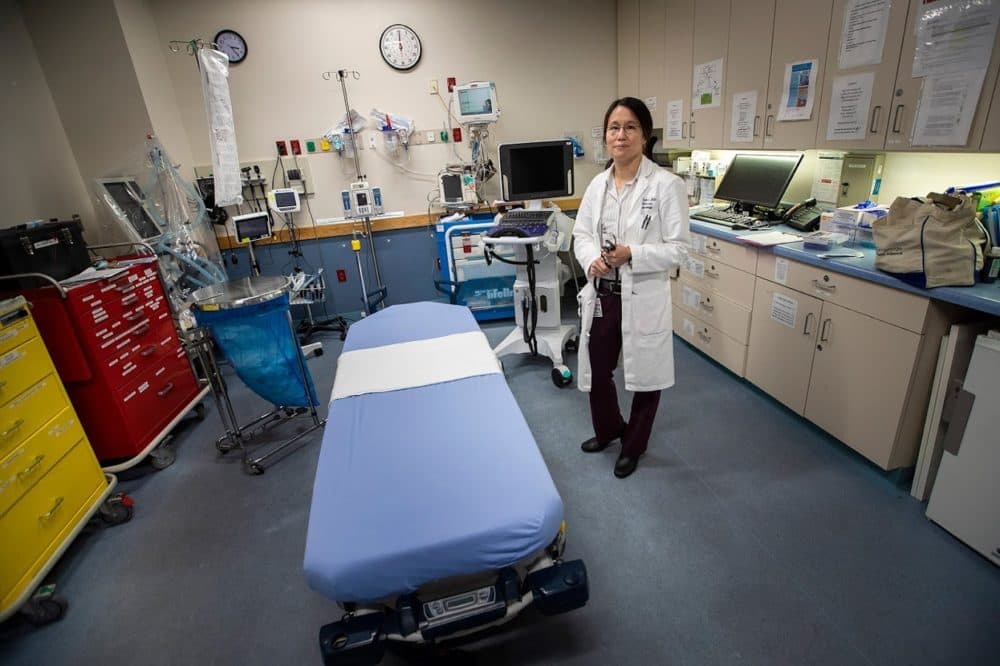Advertisement
Inside an emergency room in Everett, fears mount as COVID cases climb

When patients or nurses need help in an emergency room, an alarm normally sounds. At Cambridge Health Alliance hospital in Everett, the beeps from the alarms never seem to stop these days.
The CHA Everett ER had near record levels of patients last week, even though the holiday week is normally quiet. On a recent afternoon, there were at least 30 patients crowded in a waiting room designed for only half that number, making it difficult for nurses to maneuver around the room and assess patients' condition.
But what is happening in Everett is increasingly the state of affairs at emergency rooms across Massachusetts. Groups representing state emergency room doctors and nurses are out with a warning Monday: That ERs are close to a breaking point, as COVID cases rise and people seek medical care they postponed over the holidays.
Doctors fear the flood of COVID cases could have dire consequences. At the Everett ER, there are already increasingly long waits to see patients. Some wind up getting frustrated and walk out.
“I am very worried that we are going to miss someone or something catastrophic,” said Dr. Melisa Lai-Becker, who runs the CHA Everett emergency department.
One issue contributing to the logjam: Many people are flocking to ERs for routine flu or COVID tests after struggling to find appointments elsewhere. Lai-Becker estimates roughly 40% of patients who show up to her emergency room want a test, but aren't sick enough to need emergency care.
That's something doctors are trying to discourage, because they already feel overwhelmed. And Lai-Becker wants to make sure the ER is ready for patients with actual emergencies — issues like chest pain or trouble breathing.
“If you’re having a hard time breathing or having chest pain, you must, must, must come to the emergency department,” Lai-Becker said. "If you think you just need to get tested for COVID, please call your doctor, go to a testing center or go to urgent care," she said.
Dr. Eric Dickson, chief executive at UMass Memorial Health and board chair for the Massachusetts Health and Hospital Association, confirmed that other ERs are also seeing a flood of patients because of the latest COVID surge.
Advertisement
“Even having twice as many patients in your emergency room as you have beds for is unfortunately quite common right now,” Dickson said.
The state Department of Public Health reported there were 1,817 COVID patients in hospitals as of Dec. 30, triple the figure compared to mid-November. That means COVID patients alone filled about one-fifth of hospital beds. And that doesn't include all the people showing up at ERs who aren't seriously ill, but want to get tested for COVID.
Dickson says the latest surge comes a time when emergency rooms have been backed up for months. That's largely because of staffing shortages. Many health professionals left their jobs during the pandemic. And others have temporarily had to quarantine after becoming infected with COVID.
CHA Everett is currently has double the usual number of patients with only 70% of its typical staff.
Dickson worries the situation at emergency rooms could become even worse in coming weeks because of the emergence of the omicron variant. "You’ve got a perfect storm for emergency department overcrowding,” Dickson said.
Moving patients out of an emergency room can be as hard as getting them in. About one-third of beds in the Everett ER are filled with patients waiting for an opening in a psychiatric hospital placement or who need to be admitted to a hospital.
Everett’s emergency room staff often spends hours calling hospitals in search of a bed in an intensive care unit (ICU), specialized hospital units for the sickest patients. The number of COVID-19 patients in Massachusetts ICUs has tripled in the last six weeks.
When beds are in short supply, hospitals sometimes search in other states. CHA Everett has sent patients to Rhode Island, Connecticut and New Hampshire recently. But the transfers can be difficult to arrange, because there is also a shortage of ambulances. And some patients would prefer to remain closer to home.
“It’s a decision we’re calculating every single day, if not every hour,” Lai-Becker said.
The overcrowding and constant alarms also puts a burden on doctors and nurses.
“Stress management in the moment," said CHA Everett ER nurse Rich Durkee. "That's what we do."
Durkee uses two techniques to stay calm when patients get angry or someone is having a heart attack or a severely injured child arrives.
One is focusing on feeling his feet, grounded on the floor. Another is box breathing — breathing in for a fixed number of seconds, holding that breath for the same amount of time and then slowing exhaling.
“That brings me great peace in the moment," Durkee said.
CHA Everett recently received reinforcements.
Two members of the National Guard arrived last week to help with security, to roll patients on gurneys to other parts of the hospital for tests, and to monitor patients waiting for a placement at psych hospital. Durkee says they've have already made a difference.
“Anytime you’re feeling stressed, are working hard and you look up and someone else steps up with you, it’s just….”
Durkee paused, gathered his thoughts and began again. “I can’t understate how important that is and how good that feels.”
Almost everyone at the Everett ER is now working overtime. Some workers canceled holiday plans and put off winter vacations. Lai-Becker said she averages just five hours of sleep a night.
“I am begging for people’s patience and understanding,” Lai-Becker said. “We’re trying our best.”
Lai-Becker also hopes people do everything they can to stay healthy, including getting vaccinated and wearing masks. So they won’t need to join the crowd already waiting in the emergency room.
This segment aired on January 3, 2022.
